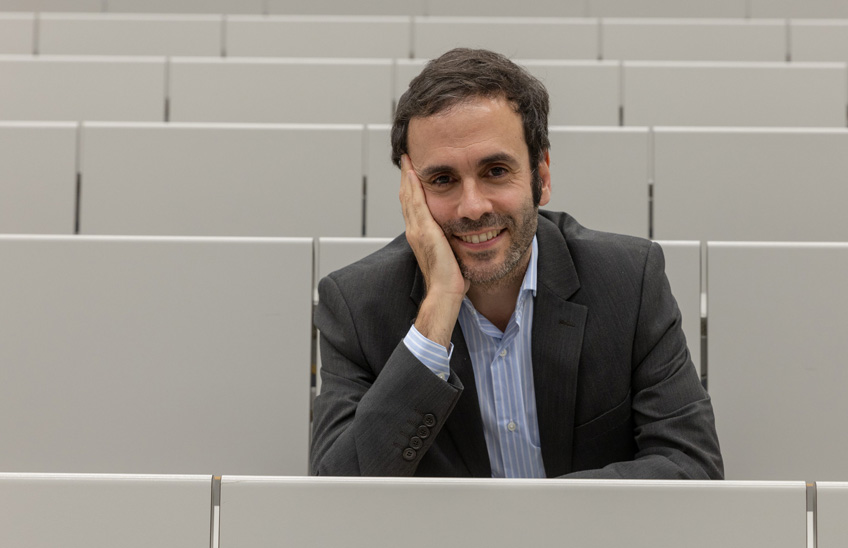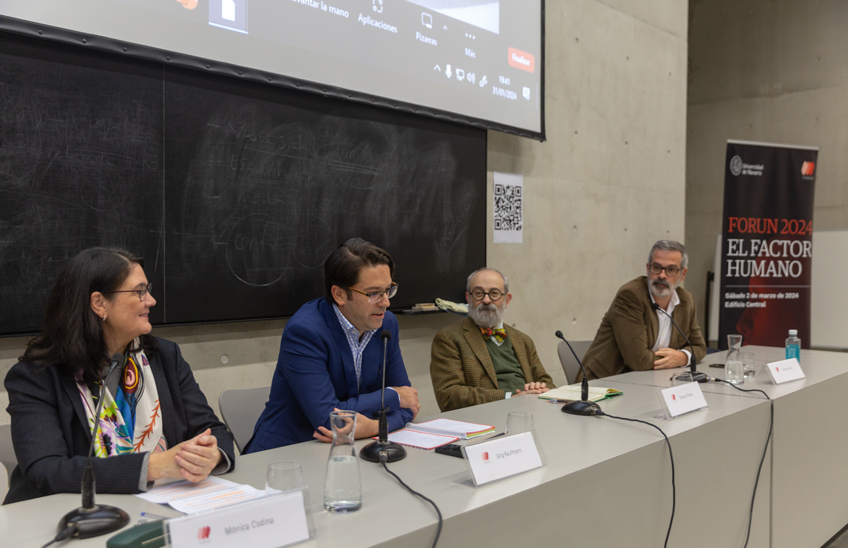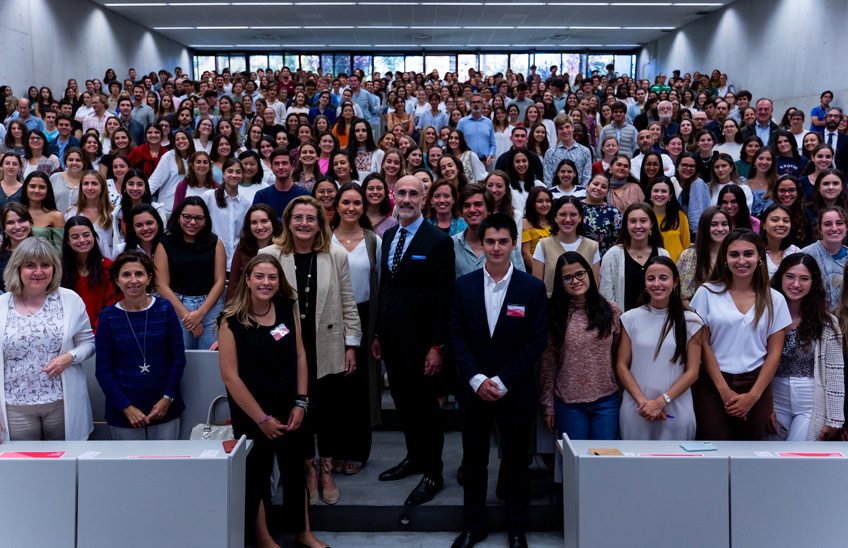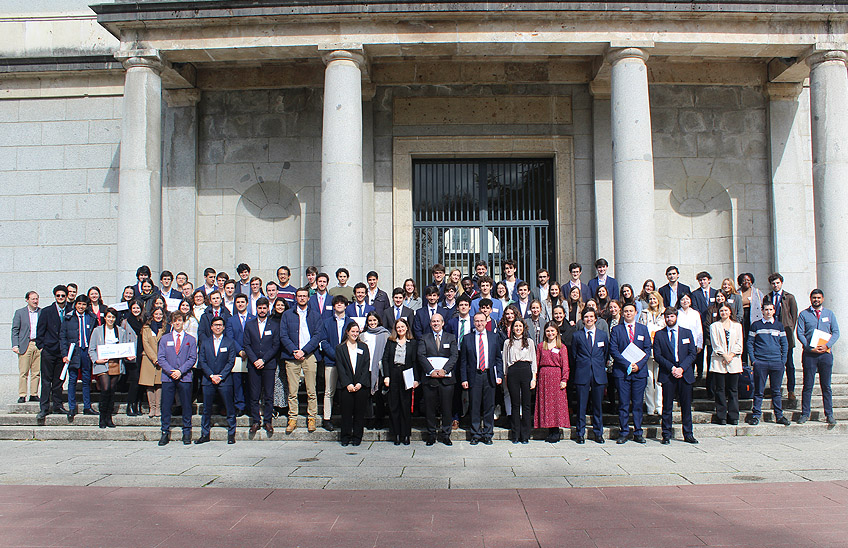"We have to dodge with a cape and bracket all the issues on which we are invited to take the same position."
On the occasion of the opening of the congress FORUN 2025, philosopher Jorge Freire visited the University to discuss community ties

PhotoManuelCastells/
14 | 10 | 2024
Jorge Freire is a philosopher, although he confesses that he feels like a frustrated philologist because he loves to play with the etymology of words. He was present last Thursday, the 10th, at the opening of FORUN 2025a congress by students for students, which this year has "Global Citizenship" as its theme topic . The meeting was held at the School of Communication, where Freire reflected on individualism, critical thinking - or the absence of it - and collectivity.
Is local, national and international information overload strengthening or loosening community ties?
Every day we hear news of cataclysms, terrible events… and that, it seems, expands the circle of our empathy or our compassion. But it is not entirely true, because you cannot care about what is happening in a remote country more than you care about what is happening to your neighbor. As cynical as it may seem, Hume said it a long time ago: “The destruction of the Universe is preferable to the scratching of a hand.” But in the internship We are not as affected by, say, a massacre of 300 people in a remote country as by the death of our cat.
Our empathy is a radial issue that expands its circle from a center that is us. We cannot care exactly the same about what happens in the antipodes of our world as what happens to us within our radius of action. And this over-information is causing us to have a lot of news about many things but that ends up inducing a discouraging state of mind. It seems that our life is becoming a kind of disaster movie .
What happened?
Fear has become chronic in our society, what we call fear, and it is affecting us so much that it is causing our reality to break down. Hannah Arendt said that fear is like “an iron belt”: there may be people isolated by fear, but if they come together the community effect is not produced. What happens is that individual freedom disappears. That is what is happening to us as a society: it seems that the common element is fear, but what it is doing is making us withdraw. There is a very well-known idea in Democracy in America (1835) by Tocqueville when he refers to the danger of arithmetical tyranny. In the second book, which he published in 1840, he retracts and says that there is something worse: civic withdrawal, that citizens stop being citizens, lock themselves in their little houses and become subjects because they have ceded the big decisions to a prince, to a caste of experts, to technocrats.
We are experiencing this now. On television, an expert tells us that, thanks to Artificial Intelligence, we are going to lose who knows how many jobs in the future, and we are standing there unmoved as if it had nothing to do with us. Since when have we yielded certain issues to what a sanhedrin of self-proclaimed technicians says? This retreat that we are experiencing is influenced by the fear that they are instilling in us. We have known fear since the Modern Age, because Hobbes already wrote in Leviathan that the best way to govern is through fear. You can govern through fear, but you are not going to govern citizens, but rather a mass of sheep. Fear and freedom are not easily reconcilable.
In this withdrawal of society, what role do technologies, social networks, global communication play…?
It is curious that the era of communication in which we live is increasingly promoting a more pronounced loneliness. The word communication comes from the word common. How can it be that communication, which is supposed to be about creating bonds, thanks to which you can connect with someone in real time, makes us increasingly isolated? We live more and more as if we were segregated atoms. This is a great paradox. We are not a society of fraternal individuals, but rather we are like completely unconnected atoms, each one taking refuge in his own private space. Oswald Spengler already announced this in The Decline of the West . When you live in fear, with anxiety, etc., you see everything in a very narrow way, like a tunnel. And we only speak with optimism when we talk about a past that was better.

Gallery of the opening ceremony of the congress Forun 2025. PHOTOS: Manuel Castells
Where is the space for critical thinking and collective consciousness?
We should distance ourselves from this society because we are asked to be spectators, like a Greek chorus that has to be surprised, frightened, excited, moved. Society asks you to be a spectator and to be moved by what you see. But I refuse to become a Greek chorus because I am a citizen. One way to escape this carnival would be to simply establish a certain distance. For example, try to discriminate what is important and what is not. Separate the wheat from the chaff. We have to be critical in the sense of not swallowing everything that is told to us. We have to dodge with a cape and put in parentheses all the questions on which we are invited to take the same position.
Is it possible to get away from all this and break with what has been imposed on us?
I think that individual solutions are of no use to us. For example, if there is acid rain, you can buy a mask and save yourself, but you have not solved the problem. topic from pollution. In this way, with individualism, we are not going to restore the community bond. I think about how much it costs bees to make their honeycomb, the honey... If you hit it with a ball, the honeycomb breaks and there is no one to fix it. In the face of a broken society, there may not be a way to suture that wound, maybe it cannot be fixed. I hope I am wrong. But it is worth remembering that our nature is communal. Individualism is wrong, it sells us a wrong vision of humanism. The human being is not someone alone on an isolated island, he is not a Robinson Crusoe who does not need anyone. We are faced with an anthropological vision that we have to share: the human being is a social animal that needs others, he is a relational being and that brings us back to the community.
What role do young people play?
It's curious because, although they play their role in democracy and vote, they are not capable of overthrowing governments. Even political programs are not aimed at young people, but at baby boomers , because this society is aging. And young people have a negative view of everything, because they don't feel integrated either. Not to mention technology. It is something that is also seen in parents, with their little noses in the screen. It is not a generational problem. Nietzsche already said in Thus Spoke Zarathustra that "every generation that is not ascending is degeneration."



